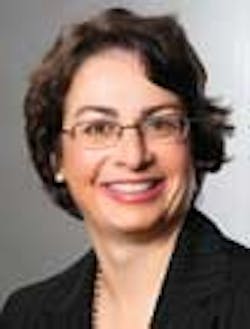BEYOND THE OPERATORY
BY ANN-MARIE C. DEPALMA, RDH, MEd, FADIA, FAADH
During the past several years, many hygienists in clinical private practice have seen their hours reduced or their positions eliminated. Many of these hygienists don't know where to turn to continue to earn a viable income. In her program "Stepping Out of the Operatory: Your Guide to Alternative Career Choices," Josalyn Sewell, RDH, inspires hygienists to look beyond their clinical practice to use their skills, education, and talents in areas beyond the operatory.
Josalyn encourages hygienists to learn more about options in public health, orofacial myofunctional therapy, education, consulting, and corporate arenas. She also discusses moving beyond dentistry into areas such as grant writing, starting a business, or becoming involved in medical practices such as pediatrics, geriatrics/nursing homes, ob-gyn, cancer, dialysis treatment centers, or care of the homebound.
Hygienists have a vast array of knowledge that goes beyond the clinical area, and tapping into that knowledge can elevate one's position to heights not previously realized. Often hygienists who find themselves unemployed or underemployed doubt their abilities. Josalyn motivates participants to reexamine their skills in ways they may not have previously recognized.
Participants in the program will:
- Discuss opportunities beyond the clinical operatory and establish contacts to learn about these opportunities
- Create a professional image on paper by developing a professional resume, CV, or portfolio
- Use networking and social media for professional enhancement.
Josalyn knows that the dental hygiene employment picture isn't what it used to be. The days of graduating from a dental hygiene program and finding a full-time clinical position in private practice have changed. Those positions are few and far between, and instead of allowing oneself to become bitter about a tough employment environment, one needs to stand up and be counted, so Josalyn designed her program for hygienists only rather than for all team members.
Hygienists know how to care for people in many ways. Josalyn encourages participants to use their caring skills to advance themselves professionally. Her handouts encourage participants to ask open-ended questions that stimulate ideas long after participants return home. She includes website resources for further investigation, and has also started a blog called helpfulhygienist.blogspot.com to continue discussions after programs.
Josalyn became interested in alternative practice settings as a dental hygiene student. Upon graduation, job opportunities were tight, but she needed to support her family. She felt her personality, talents, and passions were too big for one operatory. She admires every hygienist who works day in and day out to create beautiful, healthy smiles, but that just wasn't for her because she prefers variety in her daily encounters. This calling guided her to find alternatives to clinical practice. Her mentor, Jackie Sanders of Sunstar Butler, encouraged her to teach continuing education.
Josalyn graduated from San Juan College in Farmington, New Mexico, in 2007. In 2008, she was asked to present information during a program about her experiences in job hunting as a new graduate. She received positive feedback from her first speaking venture and was asked by Sunstar Butler to present the following year at the same program. Her CE programs have grown, and she describes her growth and development in a few words -- networking, hard work, humility, and gratitude.
Josalyn is passionate about her husband, children Ethan and Lyla, and their golden retriever, Charlie. Ethan was diagnosed with autism; therefore Josalyn is passionate about working with individuals with special needs. She also recently took up running and has run a half marathon. Her running provides a sacred time where she can focus on trying to solve a problem or think of nothing at all. She is a member of ADHA and has served as president of the New Mexico Dental Hygienists' Association. By becoming involved in the professional association, Josalyn feels that hygienists can step out of the "victim" mentality and forge new career paths for themselves.
Josalyn enjoys teaching and finding creative ways for participants to use her information. She has helped family and friends secure new jobs by revising resumes to highlight their skills and talents. She finds it rewarding to be part of the job seeker's process, and enjoys witnessing others gain confidence as they travel through the employment process. Her programs demonstrate her dedication to changing lives and allowing others to grow and find alternative career paths.
For more information about Josalyn's programs, contact [email protected].
Thought for the month: At every moment, the universe is making you an irresistible offer. Anonymous RDH
This month's INeedCE.com course is: "CAMBRA: Best Practices in Dental Caries Management." RDH magazine readers will receive 47% discount when using the code ANJUL12.
Description: The current approach to dental caries focuses on modifying and correcting factors to favor oral health. Caries management by risk assessment (CAMBRA) is an evidence-based approach to preventing or treating dental caries at the earliest stages. Caries protective factors are biologic or therapeutic measures that can be used to prevent or arrest the pathologic challenges posed by the caries risk factors. Best practices dictate that once the clinician has identified the patient's caries risk (low, moderate, high, or extreme), a therapeutic and/or preventive plan should be implemented. Motivating patients to adhere to recommendations from their dental professionals is also an important aspect in achieving successful outcomes in caries management. Along with fluoride, new products are available to assist clinicians with noninvasive management strategies.
For more information, visit IneedCE.com.
Past RDH Issues

